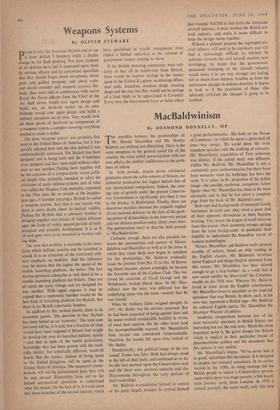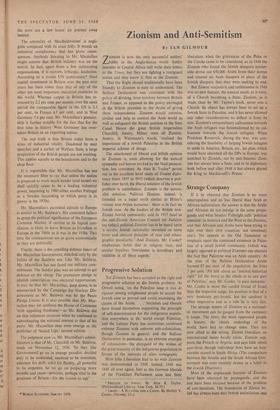MacBaldwinism
By DESMOND DONNELLY, MP rrHE parallels between the premierships of 1 Mr. Harold Macmillan and Mr. Stanley Baldwin arc striking and disturbing. There is the same smugness in the general social life of the country, the same selfish preoccupation with our own affairs, the shallow indifference to the prob- lems of others.
In both periods, despite prime ministerial platitudes about the achievements of Britain, our industrial production has lagged behind that of our international competitors. Indeed, the aver- age rate of growth under the present Conserva- tive Government is significantly less than it was in the heyday of Baldwinism. Finally, there are disastrous parallels between the culpable neglect of our national defences in the face of the grow- ing power of dictatorships in the inter-war period and our defence position today, thirty years later. The portmanteau word to describe both periods is `MacBaldwinism.'
Curiously enough, there are also parallels be- tween the personalities and careers of Messrs. Baldwin and Macmillan as well as in the times in which they ruled. Both men began as outsiders for the premiership. Mr. Baldwin eventually made the journey from No. 11 to No. 10 Down- ing Street because, almost overnight, he became the favourite son of the Carlton Club. This fol- lowed his exorcism of Lloyd George and the Welshman's wicked liberal ideas. In Mr. Mac- millan's case the story was different but the underlying cause was the same—namely that he was 'sound.'
When Sir Anthony Eden resigned abruptly in 1957, Mr. Butler was the obvious successor. But he had been suspected of being against Suez and his name evoked considerable hostility in circles of roast beef opinion. On the other hand (and for incomprehensible reasons) Mr. Macmillan's Suez record was considered irreproachable. Therefore the mantle fell upon him, instead of Mr. Butler.
Paradoxically, this political image of the two 'sound' Tories was false Both had always stood to the left of their party and continued so to do. As this fact dawned upon the Conservative rank and file there were electoral setbacks and dis- illusionments throughout the early periods of their leaderships.
Mr. Baldwin re-established himself in control of his party largely because he proved himself a great parliamentarian! His hold on the House of Commons—in which he spent a great deal of time—was uniqu:t. Ht could dress the most mundane speeches with the clothing of romance. Mr. Macmillan's acquisition of Tory authority was similar, if the actual story was different. Unlike Mr. Baldwin, Mr. Macmillan is not a consistently great parliamentarian but there have been moments when hi.; technique has been the same. It is rather in the projection of his public image—the sensible, moderate, competent, father figure—that Mr. Macmillan has been at his most successful and in this he has taken a complete page from the book of Mr. Baldwin's story.
Both men had backgrounds of moneyed family businesses. In each case they owed a great deal of their apparent shrewdness to their business training. They learnt the jargon of small business from this source. Their economic myopia springs from the same background: in particular their inability to understand the boundless march of modern technologies.
Messrs. Macmillan and Baldwin both adopted mantles of culture, based on wide reading in the English classics. Mr. Baldwin's mystique about England and things English stemmed from this source. Mr. Macmillan has been shrewd enough to go a step farther : in a world that is now much smaller he `discovered' the Common- wealth on his 1958 tour. Whereas M r Baldwin loved to muse about the English contribution,, Mr. Macmillan loves to speculate on the imperial splendour that was Britain. In short, each, in his own way, represents a British type—Mr. Baldwin the cultured English squire, Mr. Macmillan the Mortimer Wheeler of politics.
Academic comparisons between two of the most successful operators in British history are interesting but not the real story. Much the more important point is the grave danger for Britain which is implicit in their particular brand of phenobarbitone politics and the decadence that this creates in our society.
Mr. Macmillan's slogan, `We've never had it so good,' epitomises this decadence. It is designed to deaden our national conscience. In its earlier version in the 1930s, its smug message led the British people to return a Conservative govern- ment whilst there was tragic poverty a few hours' train journey away from London. In 1959 it created precisely the same result, only this time the poor are a few hours' air journey away instead.
The amorality of 'MacBaldwinism' is negli- gible compared with its crass folly. It breeds an industrial complacency that has grave conse- quences. Anybody listening to Mr. Macmillan might assume that British industry was on the march. In fact, apart from a few outstanding organisations, it is narrow, lethargic, leaderless. According to a recent UN publication,* fixed capital investment in Britain over the past nine years has been iower than that of any of the other ten most important industrial countries in the world. Whereas output in Britain has in- creased by 2.2 per cent. per annum, over the same period the comparable figure in the US is 3.3 per cent., in France 4.3 per cent., and in West Germany 7.4 per cent. Mr. Macmillan's premier- ship is further notable for the fact that for the first time in history West Germany has over- taken Britain as an exporting nation.
The real truth is that Britain today faces a crisis of industrial vitality. Deadened by easy speeches and a surfeit of Welfare State, a large proportion of the British people are not working. This applies equally to the boardroom and to the shop floor.
, It is regrettable that Mr. Macmillan has not the necessary fibre to say that unless the nation is prepared to work much harder (and better) we shall quickly cease to be a leading industrial power, becoming by 1980 either another Portugal or a Sweden (according to which party is in power in the 1970s).
Mr. Macmillan's parochial attitude to Europe is similar to Mr. Baldwin's. His consistent failure to grasp the political significance of the European Common Market, if carried to its logical con- clusion, is likely to lease Britain as friendless in Europe in the 1960s as it was in the 1930s. This time the consequences are as grave economically as they are politically.
Finally, there is the appalling defence fiasco of the Macmillan Government, matched only by the follies of the Baldwin era, Like Mr. Baldwin, Mr. Macmillan has not faced our military com- mitments. The Sandys plan was an attempt to get defence on the cheap. The premature pledge to abolish conscription was electoral opportunism. It may be that Mr. Macmillan, deep down, is as mesmerised by the Campaign for Nuclear Dis- armament as Mr. Baldwin was by the Peace Pledge Union. It is also possible that Mr. Mac- millan may yet confront the House of Commons 'with appalling frankness'—as Mr. Baldwin did on that infamous occasion when he confessed to subordinating the national interest to that of his party. Mr. Macmillan may even emerge as the publisher of 'Sealed Lips,' second edition.
The judgment now or, Mr. Macmillan's admin- istration is that of Mr. Churchill on Mr. Baldwin, made on November 12, 1936. 'So they [the Government] go on in strange paradox, decided only to be undecided, resolved to be irresolute, adamant for drift, solid for fluidity, all powerful to be impotent. So we go on preparing more months and years—precious, perhaps vital to the greatness of Britain—for the locusts to eat.'
• WORLD ECONOMIC SURVEY 1959.





















 Previous page
Previous page